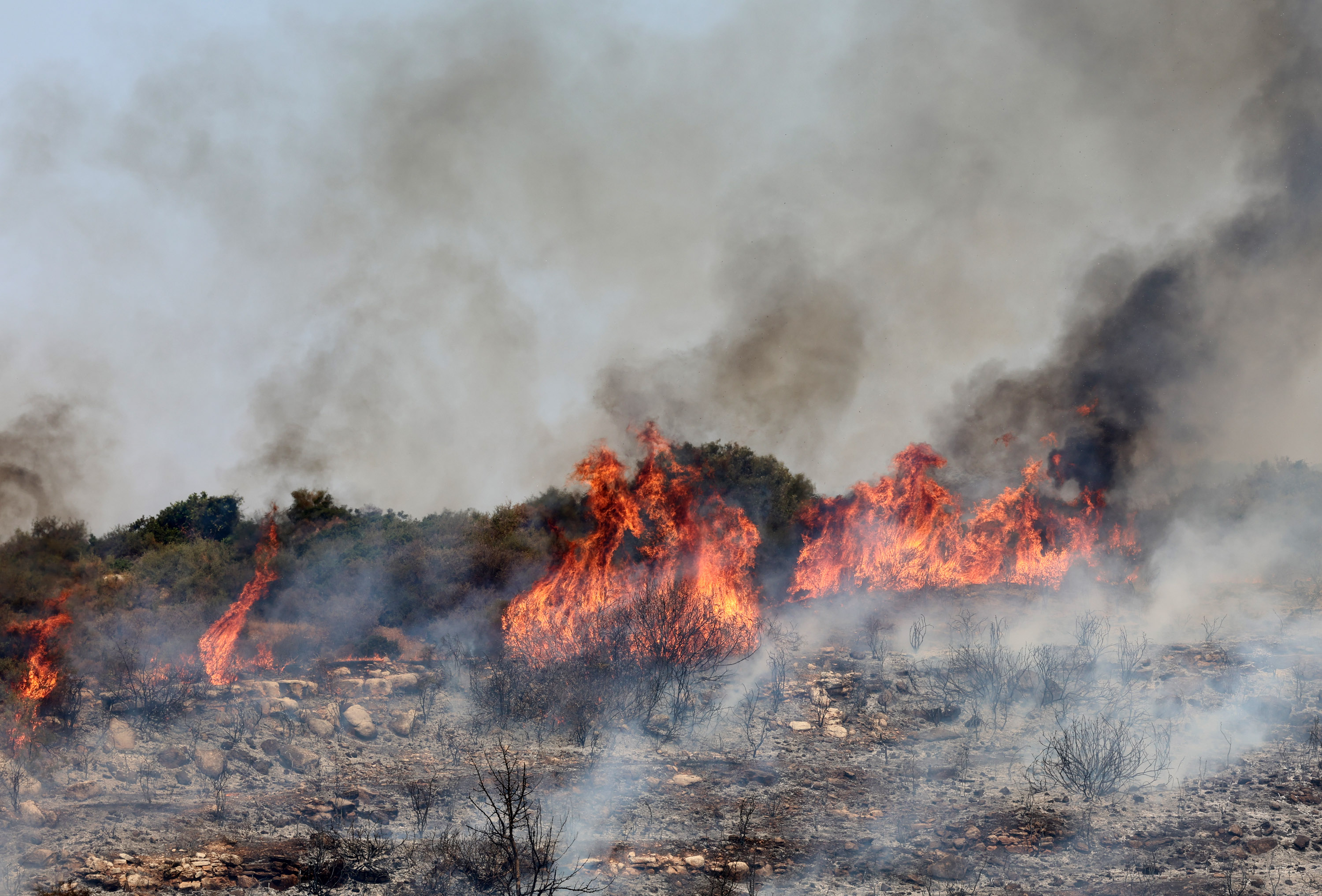In the searing summer heat firefighters throughout Thursday continued to battle the blaze that incinerated an estimated 120 square kilometres in the Limassol district, with two people confirmed dead and at least two injured, as residents of more than a dozen communities had to flee their homes.
The two who died, an elderly couple, were found in a burnt-out car on the road between the villages of Monagri and Alassa. The finding of a body in the car had first been reported at around 9pm on Wednesday, with a second body being found later in the evening.
Attempts to identify the bodies were ongoing. The car and the bodies were transferred to police custody.
Health authorities said late on Thursday that seven persons were receiving treatment in hospitals – two for burns.
As of late Thursday, just before dusk, firefighters were active on five fronts: at Pachna, trying to contain flare-ups; at the Vounaros area within the Ypsonas industrial zone; near the village of Souni; in the village of Mandria; and outside the village of Omodos.
The latter fire, near Omodos, was the “toughest operation”, said fire department spokesman Andreas Kettis.
Unconfirmed media reports said some residents of Omodos were refusing to evacuate.
Just before 8pm, Kettis provided an update – there were no more “active fronts” other than flare-ups in certain locations. All land-based firefighting forces continued to operate and would stay on standby throughout the night.
Operating alongside the fire department were personnel from the forestry department, Civil Defence, the Limassol district local government authority, assisted by organised groups and volunteers.
In total, 13 firefighting aircraft were making airdrops until the sun went down.
Private companies were meantime pitching in, providing fuel for the aircraft free of charge, as well as other supplies needed to combat the fires.
Reports meantime emerged that the wildfires, which broke out on Wednesday and continued raging throughout Thursday, fanned by wind gusts, may have been set deliberately.
Fire chief Nikos Longinos said eyewitnesses had informed authorities that the fire was started deliberately at two separate points, 100 metres apart, near the village of Malia.
Community leader of Malia, Marilena Athini, later said that arson was likely, as a fire had been set at the same spot about two weeks ago and was promptly extinguished.
Rough estimates spoke of 70 to 80 premises having been badly damaged since Wednesday. The Civil Defence set up three hosting facilities for evacuees.
Panayiotis Liasides, spokesman for the Civil Defence, told the Cyprus Mail that around 80 people were being hosted at these facilities and would stay there overnight. Others who fled their villages were staying with relatives.
As of the last count, fourteen communities had to be evacuated, with some locals accusing authorities of a slow response time.
All these statistics were preliminary, as the situation remained fluid.
Earlier in the day, the acting district officer for Limassol told media that by noon damage had been reported to 53 homes, of which 32 were completely gutted. According to Elektra Panayiotou, 88 vehicles were also damaged by the fires.
With some voices in the affected areas stating that the government could have done more and even accusing the government of negligence, Justice Minister Marios Hartsiotis stressed that as far as he was concerned, the government did everything it could.
“Everything that could have been done under the circumstances was done. This is not the time for apportioning blame,” he said.
“The fire must be brought under control. I understand the pain, the sadness, and the destruction of a lifetime’s worth of work, but that does not imply disorganisation on the government’s part.”
Foreign countries meanwhile heeded the call for help. Egypt sent two firefighting aircraft, with Jordan sending four, while Israel, Lebanon and Spain pledged to assist in the same way.
The two arriving Israeli C-130 aircraft would make nighttime air drops.
Greece dispatched 26 firefighters.
The EU stated that as part of its civil protection mechanism, two Canadair firefighting aircraft from the bloc’s joint firefighting fleet, known as rescEU would be sent to Cyprus. The aircraft are ordinarily stationed in Spain.
Meanwhile, the British high commission in Nicosia confirmed that the British bases in Cyprus are “providing firefighting assistance to the Cypriot authorities” and are “in contact to provide any further support”.
The government pledged immediate financial support to community councils to meet emergency needs, fully restore property damage, support temporary housing, and cover basic necessities.
In addition to government efforts, various civil society groups and municipalities stepped up to offer aid, including free accommodation and donations for those who lost their homes.
The municipality of Amathus, near Ayios Tychonas, said it remained available to provide shelter and material support. It also established a collection centre for essential goods.
Members of the public wishing to contribute may deliver items such as non-perishable food, long-life milk, dry goods, nappies, and baby wipes to the Mouttagiaka primary school or Linopetra high school.
The Cyprus Red Cross (CRC) said its volunteers were distributing basic necessities in Ayios Ambrosios, Pachna, Trimikli and Episkopi. It had also deployed teams to assist in Episkopi, Erimi and Pachna, where fires were still active.






Click here to change your cookie preferences